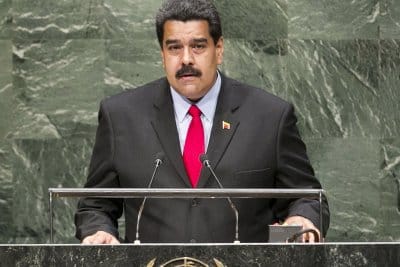Hundreds of fishermen traveled through six Venezuelan states Saturday to protest what they call aggression by the United States, which maintains a naval presence in the Caribbean Sea near the South American country’s border in what the Pentagon says are efforts to combat drug trafficking. Photo by Henry Chirinos/EPA
Sept. 22 (UPI) — Venezuelan Vice President Delcy Rodríguez confirmed that President Nicolás Maduro sent a letter to U.S. President Donald Trump, saying he was willing to hold direct talks with Trump’s special envoy, Richard Grenell.
“The letter was delivered Sept. 6 to a South American intermediary to be passed on to its recipient. … In it is reflected Venezuela’s irrefutable truth: We are a territory free of illicit activities, peaceful and secure,” Rodríguez said on Telegram, where she also published the letter.
It added: “The military threat against Venezuela, the Caribbean and South America must cease, and the proclamation of a Zone of Peace must be respected.”
In the letter, Maduro said “many controversies have arisen around the relationship between the United States and Venezuela. In the midst of these controversies we have witnessed countless fake news stories circulating in the media.”
He recalled “the fake news claiming that Venezuela had refused to accept migrants returning to our country,” adding that the issue “was resolved and clarified quickly in a conversation with Grenell, Trump’s special envoy to Venezuela.”
Maduro said “This channel has functioned impeccably during the first months of your second administration. We have always sought direct communication to address and resolve any issue that arises between our two governments.”
White House press secretary Karoline Leavitt said in the daily news briefing Monday that “We have seen the letter. Frankly, I think there were a lot of lies repeated by Maduro, and the administration’s position on Venezuela has not changed.
“We view the Maduro regime as illegitimate, and the president has clearly shown that he is willing to use any and all means necessary to stop the illegal trafficking of deadly drugs from the Venezuelan regime into the United States,” Leavitt said.
The letter was sent days after Trump announced on his social media platform, Truth Social, that he had ordered a “kinetic strike” on a vessel “linked to a cartel” departing Venezuela, saying there was “proof” the boat was carrying drugs. Eleven alleged members of the Tren de Aragua gang were killed in the strike.
“In recent weeks, there have been absolutely false accusations of links with mafias and drug-trafficking groups involving Venezuela’s legitimate authorities,” Maduro added in his letter.
In his view, this is the worst “fake news” directed at his country, meant to justify an escalation into an armed conflict that would cause catastrophic damage to the continent. The president said Venezuela is a “territory free of drug production and a country irrelevant in the field of narcotics.”
He also cited United Nations data indicating that only about 5% of the drugs leaving Colombia “attempt” to transit through Venezuela, where they are “fought, intercepted and destroyed” once seized.
He added that “a very relevant fact is that this year we have already neutralized and destroyed more than 70% of that small percentage that tries to cross through the long border of more than 2,200 kilometers we share with Colombia. We have destroyed 402 aircraft linked to international drug trafficking in accordance with Venezuelan law.”
Maduro closed his letter by inviting Trump to “preserve peace through dialogue and understanding across the hemisphere. This and other issues will always remain open for a direct and frank conversation with your special envoy Richard Grenell, to overcome media noise and fake news.”
Between the delivery of the letter and its public release, relations with the United States saw a rapid military escalation: Trump announced successive “kinetic strikes” on boats departing from Venezuela.
At least 15 people have been killed in the airstrikes, with Trump said they were “terrorists” involved in drug trafficking. The fatal interdictions came from expanded U.S. naval deployment in the Caribbean under an “anti-drug” campaign that has included allies.
Venezuela has announced a “Sovereign Caribbean 200” campaign in response to U.S. military movements in the region.
